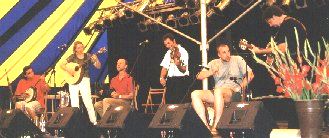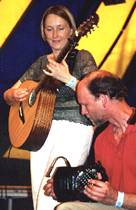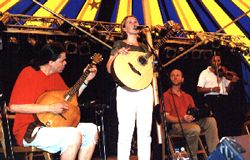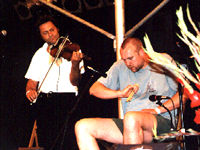FolkWorld article by Michael
& Christian Moll:
The Continental Celts series, Part VI
Irish Music à la carte
Dereelium, Germany's best
EXPO 2000 in Hanover is over, so why again setting the spotlight
on Hanover? Well maybe because out of this town comes probably the best German
Irish trad. Band, that can easily take it up with its Irish colleagues. Or because
Hanover hosts some of the best Irish folk sessions in Germany, where always
this Irish trad band plays an important part.
 We met this band, Dereelium, in Holland, where they played at the first Folkwoods
Festival in Eindhoven. They were invited on recommendation of Brendan White,
Irish bodhran maker living in the Netherlands, as a good value replacement of
the expensive Irish originals, that the festival could not afford in its first
year.
We met this band, Dereelium, in Holland, where they played at the first Folkwoods
Festival in Eindhoven. They were invited on recommendation of Brendan White,
Irish bodhran maker living in the Netherlands, as a good value replacement of
the expensive Irish originals, that the festival could not afford in its first
year.
Their gig at Folkwoods was not an easy job, as the sun burnt on tent 2, leaving
the musicians and audience sweating, and as half way through in tent 1 the Dutch
"Chieftains Riverdance" had an appearance. Nevertheless Dereelium gave a very
good set. Folkwoods was already Dereelium's second big festival in 2000, after
having been invited to play at Rudolstadt, Germany'' biggest festival for Folk
& World Music. To be playing in Rudolstadt was quite an honour, as usually the
festival would not book German Irish bands. With the big festivals discovering
Dereelium, it is obvious, that Dereelium's music must be something special.
Millvalley was the name of Dereelium's Debut-CD that appeared last year, and
was taken up enthusiastically by fans and media. The FolkWorld magazine called
Dereelium "probably the best German band of "Continental Celts"; and indeed
Dereelium offers a lot of talent, featuring some of the definite best musicians
of Irish trad on offer on the German scene. On stage they can very well convince
with their music, yet they are at their best in the intimate sessions, where
they originally come from.
 The strength of Dereelium lies in their mixture of well-known Irish tunes and
more or less unknown Irish, but also Eastern European, Spanish-Celtic, self
composed or whatever kind of tunes. This gives the music a very personal identity,
setting them apart from most other Irish bands. With an instrumentarium of bouzouki/singing
(Barbara Steinort), fiddle (Michael Möllers), English concertina (Georg Möllers),
banjo/mandola/Schäferpfeife (German bagpipes) (Klaus Gehrmann), guitar/bass
(Reiner Köhler) and bodhran/bones (Rolf Wagels) Dereelium offers a very full
and attractive sound.
The strength of Dereelium lies in their mixture of well-known Irish tunes and
more or less unknown Irish, but also Eastern European, Spanish-Celtic, self
composed or whatever kind of tunes. This gives the music a very personal identity,
setting them apart from most other Irish bands. With an instrumentarium of bouzouki/singing
(Barbara Steinort), fiddle (Michael Möllers), English concertina (Georg Möllers),
banjo/mandola/Schäferpfeife (German bagpipes) (Klaus Gehrmann), guitar/bass
(Reiner Köhler) and bodhran/bones (Rolf Wagels) Dereelium offers a very full
and attractive sound.
The musicians found together in sessions in Hanover's "Notenkiste" in the eighties.
The band was formed then in 1988, playing a charity gig to raise money for a
disastrous folk festival in the Haus der Jugend, that left a huge mountain of
debts. Three of the original members are still in the band, the other three
joined them during the following years.
Dereelium play mainly because of their enthusiasm, just to have fun. Most of
the musicians play also in other bands, some of them also to make some money,
but Dereelium is definitely a hobby band - yet they do have a very professional
sound.
The band name is often considered by Irish and American people as superb, the
problem is that most Germans do not understand this play of words, as you need
to know what a reel is, and that IS in Germany a problem. This makes Dereelium
also to one of the most often misspelt bands in Germany...
There are six different stories how the individual band members came to Irish
Music; we focus on the Black-White- Movies, Waldhorn and Football versions.
Michael Möllers, playing already for 25 years Irish Folk on the fiddle, remembers
that an Irish guy moved into his town in 1975, who played music and sang. "He
organised together with the organiser Willi Schwenken 'Irish Nights'. There
you would see Black-and-White movies in Gaelic language, with wonderful pictures,
showing legends like Seamus Ennis and Christy Moore in their natural surroundings.
Along to this you would drink your Guinness, and there would be live music.
I was totally impressed by these events." So he decided to take up this kind
of music on the fiddle, just teaching himself.
 Rolf Wagels played formerly "Waldhorn" (a German horn) in an orchestra, and
via an exchange of orchestras he came to Ireland, getting there in touch with
the culture. On his next trip he decided to buy a bodhran, bought later on a
proper one from Brendan White, and went then to session in Hanover.
Rolf Wagels played formerly "Waldhorn" (a German horn) in an orchestra, and
via an exchange of orchestras he came to Ireland, getting there in touch with
the culture. On his next trip he decided to buy a bodhran, bought later on a
proper one from Brendan White, and went then to session in Hanover.
Football brought Klaus Gehrmann to Irish Music: "Actually, the music has come
to me, in shape of the Irish national team, playing in 1988 at the Football
EM in Hanover versus Russia. I bought a 5 marks ticket, and ended up just in
midst the Irish fan club." Having celebrated that afternoon and evening with
the Irish, he became aware of what Ireland is like. "When I went to Ireland
to visit the guys of the football game, I came back home with a bodhran, and
started playing Irish Music on my instruments." Klaus is the one in Dereelium,
who contributes unusual non-Irish tunes, and one of his instruments is also
the German "shepherd's pipes" (Schäferpfeife).
Asking about the Hanover session scene, we get with a smile the answer: "Most
of the Hanover scene found together at some point, called themselves Dereelium
and recorded a CD."
There is some truth in this answer, as there is quite no quality Irish session
in Hanover where you would find no member of Dereelium. Dereelium are without
doubt a very important, not to say the most important part of the Hanover scene.
Still there are a lot of musicians around in Hanover. The most important session
in Hanover exists already since more than 15 years, in the Notenkiste at the
Schneiderberg. The hard core of the Irish scene is always around at the mighty
Sunday afternoon sessions, and the session's reputation is good enough for that
there are even regularly musician guests from as far away as Berlin or Marburg.
Also in the Notenkiste, on Tuesday evenings there are more open sessions, focussing
not only on Irish music, but also on Jazz or Scandinavian tunes.
Then there is in Hanover also the MacGowan's Irish Pub, owned by Shay and Geraldine
MacGowan of Oisin fame, who were for some time landlords of the Notenkiste before
opening their own pub 10 years ago. In their pub, they have regularly some of
the best Irish musicians playing in concerts, and there are also often quality
sessions.

We start talking about the Irish scene in Germany in general, which is at the
moment extremely lively. The sessions are important in this sense; as Michael
Möllers says, he has not been in Ireland for the last 16 years, still he can
always play Irish music, and improve his skills.
Besides the sessions, Rolf considers the official musicians' meetings an important
part of the German Irish scene. "The German Uilleann Pipes Society has done
a lot of good work in this sense. Especially because they cater at their meetings
not only for pipers, but offer also workshops for plenty of other instruments.
This is the meeting point for the great musicians; it's always great fun and
lots of great sessions."
Then there are private initiatives as a strong support of the scene. Rolf talks
of the legendary meetings in the barn of Thomas Hecking (musician in the high
quality German Irish trad band Shanachie) near Hamm, where regularly some of
the best Irish musicians of Germany meet. "This not only contributes to the
interweaving of the scene, but provides the opportunity for many new bands to
be formed. The More Maids (a female trio interpreting Irish and other Songs
and Tunes; Dereelium's Barbara is member of them) are one example of this."
During the last ten years, the musical standard of the German Irish Folk scene
has increased enormously, just as it did in Ireland. In the musicians' meetings
you will find also more and more young people; "it is not that folk and traditional
music is the music of old people, or of the old folkies; it is obvious that
the scene covers also young people, and that it develops all the time".
A new phenomena of the last two years is that the Irish scene in Germany opens
more and more up to other (folk) music styles. Bal Folk is also increasingly
popular in the Irish scene, with Irish musicians enjoying more and more to dance
Bourees or Schottisches. The German Irish musicians take also more and more
Breton, Eastern European or whatever tunes up. "I like it very much that the
highly skilled German Irish musicians are starting to take up also other music
styles and tunes."
On the Irish sessions in Germany, this has definitely a positive effect, with
the sessions becoming more lively and individual. In the end, it is this mixture
that makes also Dereelium's music special and attractive, and only in taking
up other European influences, the Continental Celts can set themselves apart
from the originals and putting their own stamps on the music.
Latest published CD: Millvalley; on Liedekeler Records. Reviewed
in FolkWorld No. 12.
Further infos/contact: Dereelium's hompage is at www.dereelium.de.
Photo Credit: All other Photos by The Mollis
WIN copies of Dereelium's debut album "Millvalley"
To take part in the competition, answer the following question: Which event in the home town of Dereelium had the most massive media attention in 2000?.
Answers until 20/2/2001 to FolkWorld.
The Continental Celts is an irregular FolkWorld series, presenting regularly the best of Irish folk on the European continent.
Already featured bands: Shantalla (B), Orion (B), Drones & Bellows (DK).
Events: The Gaelfest near Frankfurt (D); The Copenhagen Irish Festival (DK; this issue).
Back to the content of FolkWorld
Articles, Live Reviews & Columns
To the content of FolkWorld
online magazine Nr. 17
© The Mollis - Editors
of FolkWorld; Published 12/2000
All material published in FolkWorld is © The Author via FolkWorld. Storage for private use is allowed and welcome. Reviews and extracts of up to 200 words may be freely quoted and reproduced, if source and author are acknowledged. For any other reproduction please ask the Editors for permission.
FolkWorld - Home of European Music

Layout & Idea of FolkWorld © The Mollis - Editors of FolkWorld
 We met this band, Dereelium, in Holland, where they played at the first Folkwoods
Festival in Eindhoven. They were invited on recommendation of Brendan White,
Irish bodhran maker living in the Netherlands, as a good value replacement of
the expensive Irish originals, that the festival could not afford in its first
year.
We met this band, Dereelium, in Holland, where they played at the first Folkwoods
Festival in Eindhoven. They were invited on recommendation of Brendan White,
Irish bodhran maker living in the Netherlands, as a good value replacement of
the expensive Irish originals, that the festival could not afford in its first
year. The strength of Dereelium lies in their mixture of well-known Irish tunes and
more or less unknown Irish, but also Eastern European, Spanish-Celtic, self
composed or whatever kind of tunes. This gives the music a very personal identity,
setting them apart from most other Irish bands. With an instrumentarium of bouzouki/singing
(Barbara Steinort), fiddle (Michael Möllers), English concertina (Georg Möllers),
banjo/mandola/Schäferpfeife (German bagpipes) (Klaus Gehrmann), guitar/bass
(Reiner Köhler) and bodhran/bones (Rolf Wagels) Dereelium offers a very full
and attractive sound.
The strength of Dereelium lies in their mixture of well-known Irish tunes and
more or less unknown Irish, but also Eastern European, Spanish-Celtic, self
composed or whatever kind of tunes. This gives the music a very personal identity,
setting them apart from most other Irish bands. With an instrumentarium of bouzouki/singing
(Barbara Steinort), fiddle (Michael Möllers), English concertina (Georg Möllers),
banjo/mandola/Schäferpfeife (German bagpipes) (Klaus Gehrmann), guitar/bass
(Reiner Köhler) and bodhran/bones (Rolf Wagels) Dereelium offers a very full
and attractive sound.  Rolf Wagels played formerly "Waldhorn" (a German horn) in an orchestra, and
via an exchange of orchestras he came to Ireland, getting there in touch with
the culture. On his next trip he decided to buy a bodhran, bought later on a
proper one from Brendan White, and went then to session in Hanover.
Rolf Wagels played formerly "Waldhorn" (a German horn) in an orchestra, and
via an exchange of orchestras he came to Ireland, getting there in touch with
the culture. On his next trip he decided to buy a bodhran, bought later on a
proper one from Brendan White, and went then to session in Hanover. 
